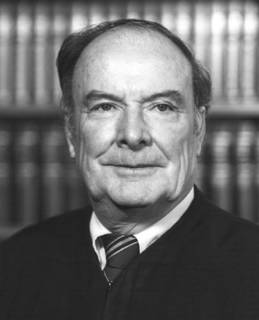You know that Martin Luther King Jr.'s birthday is January 15. As it happens, Judge J. Skelly Wright's birthday is January 14.
 Skelly Wright was born in New Orleans in 1911. He started his professional life with the prejudice of a privileged white guy of his time. Fortunately he overcame it, in ways that freed a lot of people and made the country better.
Skelly Wright was born in New Orleans in 1911. He started his professional life with the prejudice of a privileged white guy of his time. Fortunately he overcame it, in ways that freed a lot of people and made the country better.
His change of heart began at a party where he saw black and white blind people being segregated:
He said, "I once observed a Christmas party, and I saw that the party was held in separate groups, blacks and whites, and I realized they were all blind." Wright sensed the irrationality of segregation. When he told this story to journalist W.J. Weatherby, Wright "was so moved that he could not complete the story for several minutes."
Skelly Wright ordered the admission of blacks to LSU's law school in 1951. He described it as a turning point in his life: "Ordering LSU Law School integrated was my first integration order. Until that time, I was just another 'Southern boy.' After it, there was no turning back..."
Judge Wright decided many of the early desegregation cases in New Orleans... He and his wife were ostracized by many of their former friends. The feelings against integration were very hard. Wright was appointed by President John F. Kennedy to the Court of Appeals in Washington, D.C. This appointment enabled Wright and his family to leave New Orleans...
Here's Justice Ruth Bader Ginsburg on Judge Wright:
By the time I joined the D. C. Circuit in 1980, J. Skelly Wright was Chief Judge... I appreciated his intelligence and ardor, his firmness and spirit. As his colleague, I discovered that J. Skelly Wright was not easily typecast. He was tough when the occasion warranted rigor, but also gentle, even shy in social settings. And sometimes... there was in his countenance a disarming, beguiling, almost mischievous smile and glance.
Judge Wright's heroism in implementing the law of the land... has been recounted in diverse places. An incident told to me by Martha Scallon, Judge Wright's secretary nonpareil, conveys how his life was affected in the trying post-Brown years.
In May 1960, Judge Wright issued the first order ever in Fifth Circuit territory setting a day certain for the beginning of grade school desegregation. His signature on that order and earlier rulings, all of them stridently opposed by strong forces in this State and City, put his personal safety at risk. Opposition to the Judge's day-certain order, his secretary recalled, had reached fever-pitch. One evening, when Judge Wright and his wife were out, a caller from the White Citizens Council rang. (Though the phone number was unlisted, it was found out.) The Wrights' son, James, then age thirteen, answered. "Let me speak to that dirty n*gger-loving Communist," the voice demanded. Son James replied: "He's not at home. May I take a message?" Sheltered by loving parents through all the vilification and ostracism the Wrights endured, their young son simply took it in stride, along with the cross burned on the lawn and the company of U. S. marshals around the clock.
At home on a Sunday morning some 46 years ago, in February 1956, Judge Wright set down on the back of a program from a Mardi Gras ball the insight that had come to him early on in the New Orleans school desegregation case; his eloquent statement expressed the understanding that guided his stewardship of the litigation. These are his words, as they appear in his published opinion ordering the school board to desist from requiring segregation in any of the schools...:
The problem of changing a people's mores, particularly those with an emotional overlay, is not to be taken lightly. It is a problem which will require the utmost patience, understanding, generosity and forbearance from all of us, of whatever race.
But the magnitude of the problem may not nullify the principle. And that principle is that we are, all of us, freeborn Americans, with a right to make our way, unfettered by sanctions imposed by man because of the work of God.
Throughout his tenure on the D. C. Circuit, Judge Wright kept those words from his 1956 order, encased in glass, close at hand on his desktop.
In his years on the D. C. Circuit, Judge Wright listened and responded to the pleas of outsiders seeking justice under the law... Judge Wright combined "careful scholarship and courageous determination to make the law a working force in the lives of ordinary people." Dissenters, indigent consumers and tenants, government employees dismissed for homosexual behavior unrelated to job performance, all figured among those whose human dignity he strived to advance...
Judge Wright has been labeled "activist" and "liberal." No doubt he would bear those designations proudly, if properly comprehended... Judge Wright once borrowed from Theodor Geisel to state his credo:
It is claimed that judicial review is anomalously undemocratic, and if by that one means that it is often counter-majoritarian, the point must be conceded. But in another sense, the courts are the most democratic institutions we have... It is in the nature of courts that they cannot close their doors to individuals seeking justice...
In the centerpiece of his statement, Judge Wright quoted from Horton Hears a Who:
The judiciary is... the only branch of government which can truly be said to have adopted Dr. Seuss' gentle maxim: "A person's a person, no matter how small."
Happy Birthday, Judge Wright, and happy Martin Luther King Day.


































